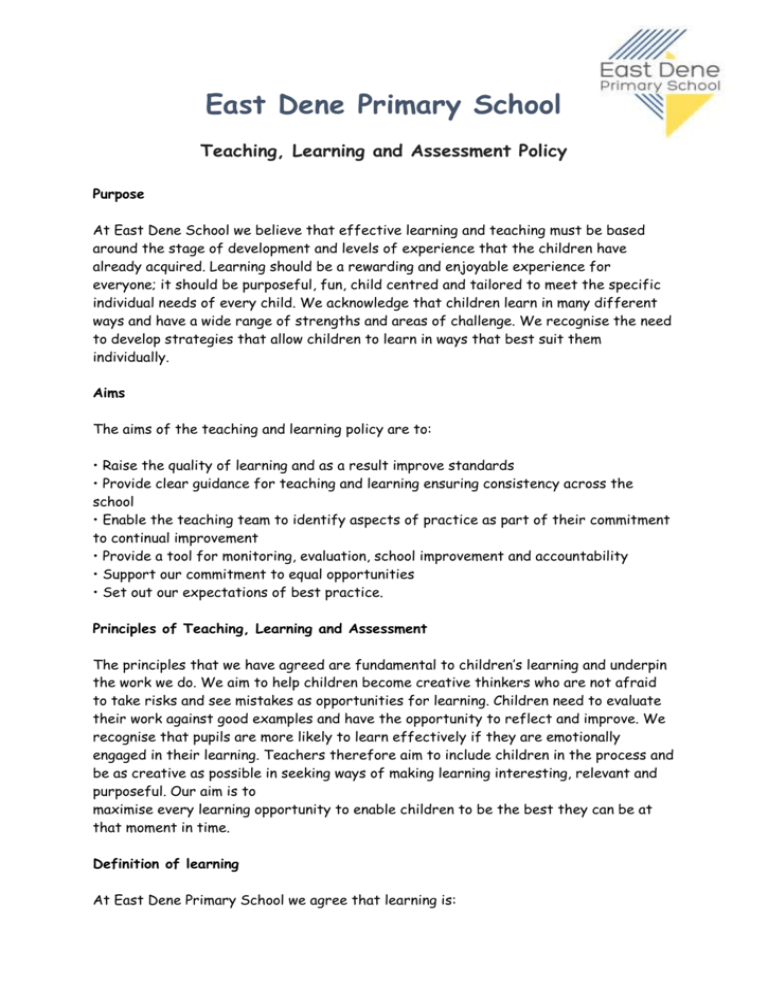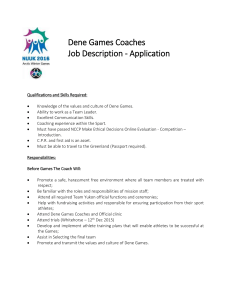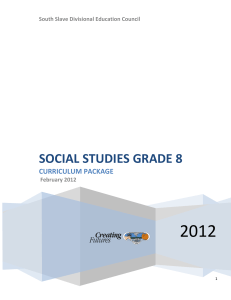Teaching and Learning Policy
advertisement

East Dene Primary School Teaching, Learning and Assessment Policy Purpose At East Dene School we believe that effective learning and teaching must be based around the stage of development and levels of experience that the children have already acquired. Learning should be a rewarding and enjoyable experience for everyone; it should be purposeful, fun, child centred and tailored to meet the specific individual needs of every child. We acknowledge that children learn in many different ways and have a wide range of strengths and areas of challenge. We recognise the need to develop strategies that allow children to learn in ways that best suit them individually. Aims The aims of the teaching and learning policy are to: • Raise the quality of learning and as a result improve standards • Provide clear guidance for teaching and learning ensuring consistency across the school • Enable the teaching team to identify aspects of practice as part of their commitment to continual improvement • Provide a tool for monitoring, evaluation, school improvement and accountability • Support our commitment to equal opportunities • Set out our expectations of best practice. Principles of Teaching, Learning and Assessment The principles that we have agreed are fundamental to children’s learning and underpin the work we do. We aim to help children become creative thinkers who are not afraid to take risks and see mistakes as opportunities for learning. Children need to evaluate their work against good examples and have the opportunity to reflect and improve. We recognise that pupils are more likely to learn effectively if they are emotionally engaged in their learning. Teachers therefore aim to include children in the process and be as creative as possible in seeking ways of making learning interesting, relevant and purposeful. Our aim is to maximise every learning opportunity to enable children to be the best they can be at that moment in time. Definition of learning At East Dene Primary School we agree that learning is: • A lifelong skill that builds upon and is shaped by what we already know. When properly nurtured, learning enables an individual to gain knowledge and understanding through observation, experience and active engagement. This process develops a unique person, open to new ideas and capable of overcoming challenges. We believe that children learn best when learning is: • Stimulating, challenging, creative, fun, varied, practical, supported, progressive, reflective, interactive and enjoyable. It should build on experience and have built in success for all. It should be based on our good knowledge of the children so that it engages them. It should have high expectations of learning outcomes and it should always be purposeful and relevant and owned by the children. They should have a role in the planning, choice of level, choice of resources, feedback and agreeing next steps. We know that effective learning occurs as part of a cycle: Underpinning effective teaching, learning and assessment is the development of children’s thinking skills and behaviour for learning. At East Dene Primary, we develop these through Philosophy for Children (P4C). The principles behind this approach are: Good thinking is learned from dialogue with others Children need to take part in dialogues that provide examples and models of good thinking The wellspring of knowledge and intellectual excitement is questioning Claims should be tested in argument; argument is seen not as a quarrel but as a collaborative search for the best answer to a question To think well is to be creative as well as critical; creative thinkers make connections, speculate and explore alternatives Good thinking depends on attitudes as well as abilities; children should be encouraged to be reasonable in the fullest sense of the word People make sense of the world though a web of concepts; we should talk with children about significant concepts It is good for children and adults to talk together about philosophical questions questions that matter and that link thinking about one area of experience to thinking about experience as a whole At East Dene Primary, this approach is developed in discrete lessons, as well being taught as part of the ‘soft skills’ we teach our children through: encouraging questioning, developing concepts, encouraging dialogue and argument, and working for reasonableness. Please see www.p4c.com for resources tailored to helping us achieve these practices and with your pupils. Further to this to enable successful learning to take place lessons should include the following: • Relevance of the learning to the real world – the big picture • Evidence of detailed planning, which demonstrates adherence to a coherent teaching sequence. • A set of clear learning intentions and Success Criteria, which are shared with pupils. • A motivating pace which supports an effective use of lesson time. • Differentiated activities to meet all learners’ needs. • A purposeful deployment of Teaching Assistants to enable all pupils to meet challenge • Providing opportunities for independent and /or group enquiry skills where appropriate • Sharing with pupils’ next step in their learning – AFL, Green pen, developmental marking, and targets. • Providing time and reflection points for pupils to self-check against success criteria • Peer assessing and self-assessment At East Dene Primary School we recognise that assessment is integral to effective teaching and learning. Effective assessment should: • • • • • • • • • Be inclusive of all abilities and skills Provide comparison to national and local Support pupil progress Provide teachers with a clear understanding of pupils’ abilities and link with future planning and teaching be easily communicated and understood demonstrate pupil progress over time provide comparisons with age-related expectations, and local and national data provide formative feedback to the teacher and pupil on a daily basis provide summative feedback to the teacher and pupil on a half-termly basis. Staff Development: In 2015, the report ‘Developing Great Teaching; Lessons from the international reviews into effective professional development’ was released. At East Dene Primary, we promote key message that a ‘one-size fits all’ approach is key and that individual staff needs must be carefully considered. For this reason, a personalised programme of support is put in place for staff through staff meetings and/or internal and external 1:1 support. Monitoring of Teaching, Learning and Assessment Effective staff development can only take place if it’s based on effective Quality Assurance systems. At East Dene Primary, the following processes are undertaken each half term to monitor the quality of teaching, learning and assessment: • learning walks • formal lesson observations • planning scrutinies (english, maths, theme, guided reading, RWrInc) • book scrutinies • pupil progress interviews • pupil voice Children We encourage pupils to: • Be willing to have a go • Try to see that mistakes are good because they can help all of us get even better • Try to be resilient, persistent, reflective and resourceful • Be supportive of others they are learning with • Be willing to share what they have been learning with others. Parents Parents are essential in helping to support their children’s learning. We encourage parents to: • Attend parent evenings/workshops/open days • Have an open dialogue with the class teacher and teaching assistant • Support the school policies e.g. homework • Support the school and work in partnership with additional support for learning e.g. individual educational plans (IEPs) and intervention programmes. The Responsibility of the Teaching Team At East Dene Primary School we aim to: • Secure good learning outcomes for pupils and to ensure pupils make good demonstrable progress and attainment • Support pupils in applying their learning to secure new learning • Support each other in continuing professional development • Communicate effectively with children, parents and other professionals regarding children’s learning and welfare. The Responsibility of the Senior Leadership Team The SLT at East Dene Primary agree to: • Be positive role models to their teaching teams • Encourage CPD opportunities for all staff • Be up to date with, Government directives, new initiatives and source exemplary practice from other schools to lead future training activities in the pursuit of continuous improvement • Support the members of the teaching team • Monitor and evaluate the impact of learning within their Phase Leadership roles. Governors Governors will monitor and review this policy and more importantly its impact practice through reports from the Head teacher and members of staff. Review This policy will be reviewed in consultation with children, staff and parents. Review Date September 2016.







![afl_mat[1]](http://s2.studylib.net/store/data/005387843_1-8371eaaba182de7da429cb4369cd28fc-300x300.png)



